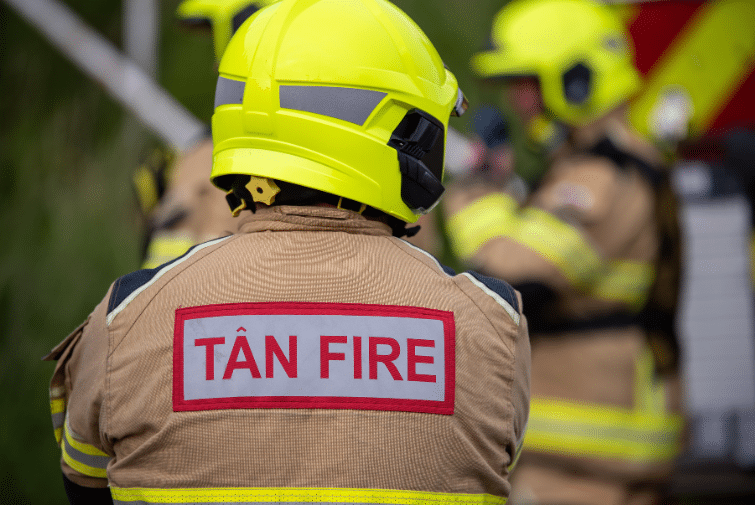Published by Skills for Justice
Working Collaboratively – Taking on Wales Fire and Rescue’s apprenticeship challenge
Date 10.05.19

Across the public sector, collaborative working is becoming highly regarded to help services and funds go further, the Fire and Rescue services (FRS) can demonstrate many examples of this. One such example being training, with the FRS training managers from across Wales coming together on a regular basis to set and implement policy.
A review of the firefighter apprenticeship framework was due in 2017, and it was proposed to help standardise training across the country and deliver on the Welsh Government’s agenda for employing apprentices to support the Well-being of Future Generations Act 2015. Each of the three FRS’ had been running full-time apprenticeship programmes for some time, albeit in different ways. They set up an All Wales Apprenticeship Working Group to consider the challenges, and invited experts from Skills for Justice to work with them on the revision of the firefighter apprenticeship framework.
The collaborative group had three key aims, to meet the apprenticeship workforce needs of the WFRS, alleviate skills gaps and fulfil the Welsh Governments apprenticeship agenda.
To consider the revision of the firefighter apprenticeship framework, a task and finish group was created, consisting of key stakeholders including sector and vocational qualification specialists from each of the three FRS’, Welsh Government and the National Training Federation for Wales, with support from Skills for Justice.
The apprenticeship framework is made up of three main parts. The knowledge qualification, the competence qualification and Key Skills. The Essential Skills are mandatory. It became clear that the framework qualification needed reviewing, due to a considerable amount of duplication. The group reviewed both the technical paper and NVQ with the agreement they should merge to become one qualification. The group worked closely with SFJ Awards to revise the qualification and to get the new qualification accredited in Wales. The revised qualification would take the place of two individual qualifications, unit one being entirely made up of knowledge and understanding learning outcomes and the remaining five units delivering on performance criteria.
Nanette Lane, Technical Consultant from Skills for Justice then worked closely with the All Wales group to provide technical support and expertise to create a revised apprenticeship framework to include the newly revised qualification, along with Essential Skills at level 2 including Digital Literacy.
At the same time as the FRS Apprenticeship group were reviewing and developing their apprenticeship framework Welsh Government were moving forward with their “Aligning the Apprenticeship model to the needs of the Welsh economy” that was published in February 2017. The policy had created a Welsh Apprenticeship Approval Board and three Regional Skills Partnership groups that would be utilised to help inform Welsh Government of priority areas for apprenticeship development. This policy also looks to ensure apprenticeship frameworks are being utilised and that employers will use the framework and providers will deliver the frameworks. So, whilst the work to review the framework was ongoing, the All Wales Apprenticeship Group needed to consider the role of a training provider in delivery of the new apprenticeship. The group recognised a need to continue a working partnership with one or more training providers in Wales.
With the support of Skills for Justice, the group ran a ‘meet the supplier’ day. This was to ensure an open and transparent approach was used to determine the best provider(s) to work with. An expression of interest document was developed by the group and circulated to all providers in Wales, via the National Training Federation for Wales, and five providers responded. All five providers were invited to present to the group. Following presentations in January 2019, three out of the five providers were successful in securing working partnerships with one of the three FRS’ to help deliver the new firefighter apprenticeship.
Keith Boswell, from Mid and West Wales Fire & Rescue Service, one of the key members of the group working closely with Skills for Justice, identified four things were key to the success of the apprenticeship review:
“Knowledge – It was vital for us to know precisely what the purpose of the project was and maintain focus on the main objectives we set out to accomplish throughout the experience. Without the knowledge of our primary goal from the get-go, we would not have been as progressive and successful as we had hoped.
“The right people are key. It was incredibly important to ensure we had the right stakeholders in place as early as possible in the working group, as each person had something different to offer. We found the earlier this was recognised the better it was for the success of the project.
“Consultation and communication are essential. We wanted to make sure that when preparing for training provider presentations and assessment, the requirements that we asked for in the brief were the precise ones we wanted to measure. We consulted widely on this with stakeholders to devise a robust scoring matrix based on proven measurements. However, if we had gone even further in consultation at this stage, we could have potentially included different criterion which may have provided more value.
“Collaboration! Keep on collaborating, keep working together to polish what you’ve created and make it better. Without the input from all stakeholders, it wouldn’t have gone as well as it did.”
Sign up to receive news and updates from Skills for Justice
"*" indicates required fields

